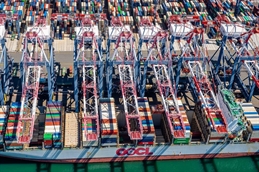
The Transpacific Eastbound (TPEB) is seeing a post-COVID plummet, with demand and rates continuing to drop.
In its latest market analysis, Flexport said multiple trades are experiencing rate declines from their pandemic highs, but the TPEB has been declining at an "unprecedented rate" since late July.
It said that the reason for these "unexpectedly precipitous rate drops" is a combination of traditional supply and demand factors.
"Far from a traditional peak season on the trade, rates are plummeting to levels not seen since 2020," the freight forwarder said on its freight market update on September 13.
Flexport noted that supply — though still far from predictable with congestion-related blank sailings steadily sapping 20-30% of capacity — has been pretty stable for the last two quarters in total TEU deployment and monthly improvements in transit reliability.
Meanwhile, demand has been decreasing due to high US inventory levels and US consumer purchasing moving towards a pre-COVID spread of goods and services.
"So far, there's no indication of where or when rates will settle. Golden Week in early October will provide a breather, likely before an October and November demand lull where, traditionally, TPEB sees some of the lowest rates of the year," it added.
For Asia-Europe shipping, Flexport said "without any peak season in Q3," demand has been slow with no recovery.
"There is also no pre-Golden Week cargo rush anticipated. Space is available but schedule reliability continues to be affected by a large number of blank sailings, vessel sliding and port omissions," the freight forwarder added, noting that port congestion in Europe, particularly Hamburg and Rotterdam, has reached critical levels causing further delays and late return of vessels to Asia.
In terms of rates, Flexport said there's ongoing rate pressure on spot rates due to low demand and capacity is generally open but impacted by blank sailings and vessel delays.
Very weak air cargo in North China
For air freight, the forwarder noted that in North China — which includes Shanghai — the market is "very weak" due to continued low demand and the short working week.
Rates have also dropped to their lowest level YTD and carriers are eager for cargo.
Flexport said for South China — Shenzhen, Guangzhou, Dongguan, and Hong Kong — the market continues to see 1-2 days of additional transit time in regards to the Shenzhen-Hong Kong border situation.
"After the long weekend cargo demand remains soft and rate levels similar to last week," it said.
For Taiwan, Flexport noted that the market remains slack after the Mid-Autumn Festival long weekend with no signs of strong demand for the week. Carriers also continue to lower rates in order to attract cargo.
For Southeast Asia, the forwarder said demand out of Southeast Asia remains soft with rates either maintaining at similar levels or decreasing slightly from last week.



